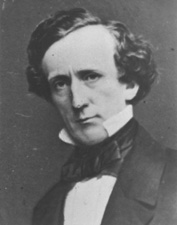Henry Mower Rice
Henry Mower Rice (* 29. November 1816 in Waitsfield , Washington County , Vermont , † 15 January 1894 in San Antonio , Texas ) was an American politician of the Democratic Party . He represented the Minnesota Territory as a delegate in the United States House of Representatives and was one of the first two Senators for the new state after Minnesota joined the Union .
Rise in Minnesota
After the early death of his father, Henry Rice grew up with friends of the family. He completed his school education and then completed a two-year law degree . When he was 18 years old, he moved to Detroit , Michigan, and worked there as a surveyor. Among other things, he was involved in the creation of the canal between Lake Superior and Lake Huron . In 1839 he got a job at Fort Snelling near what is now the city of Minneapolis . He also ran fur trading with the Ho Chunk and Chippewa Indians, which increased his popularity and gave him a lot of influence. The Indians gained confidence in him, which is why he was used as a negotiator in the conclusion of the contract with the Ojibwa people in 1847. In 1851 he became a member of the governing body ( Board of Regents ) of the University of Minnesota , which he remained until 1859.
Delegate and US Senator
Rice used his influence to get the Minnesota Territory Establishment Bill through Congress . After this was successful, he succeeded Henry Hastings Sibley as the second delegate of the new territory in Washington . He held this mandate from March 4, 1853 to March 3, 1857. In this role he drove the founding of the state of Minnesota; on February 26, 1857, the Minnesota Enabling Act was passed by Congress. On May 11, 1858, the territory was finally converted into the 32nd federal state. On the same day, Rice and James Shields entered Congress as the first two Senators of Minnesota.
On March 3, 1863, Rice resigned from the Senate; he had not tried to get re-elected. He ran for governor of Minnesota in 1865 , but only got 44.4 percent of the vote and was defeated by Republican William Rainey Marshall . After that he largely withdrew from politics. He was president of the Minnesota Historical Society and served as federal commissioner for further contract negotiations with Indian peoples between 1887 and 1888. Henry Rice died in January 1894 while visiting Texas. His younger brother Edmund was also a politician and sat for Minnesota from 1887 to 1889 as a member of the US House of Representatives.
Appreciation
A marble statue created by Frederick E. Triebel in the National Statuary Hall Collection has been a reminder of Henry Mower Rice since 1916 . In this collection, located in the National Statuary Hall of the Capitol in Washington, each state has the opportunity to recognize two people in its history for their services.
The Rice Creek , a tributary of the Mississippi , and Rice County in southern Minnesota were named after Rice .
Web links
- Henry Mower Rice in the Biographical Directory of the United States Congress (English)
- Henry Mower Rice in the database of Find a Grave (English)
| personal data | |
|---|---|
| SURNAME | Rice, Henry Mower |
| BRIEF DESCRIPTION | American politician |
| DATE OF BIRTH | November 29, 1816 |
| PLACE OF BIRTH | Waitsfield , Vermont |
| DATE OF DEATH | January 15, 1894 |
| Place of death | San Antonio , Texas |



